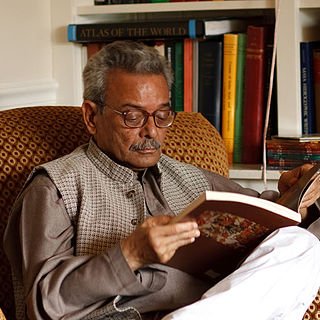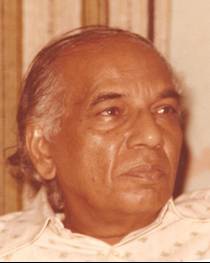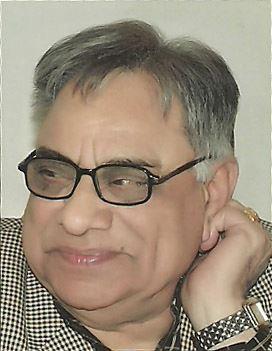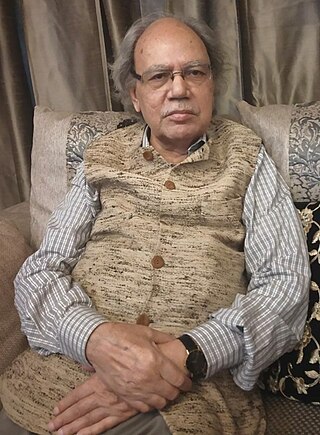Gyan Chand Jain | |
|---|---|
| Born | 1923 Seohara, Bijnore district, India |
| Died | August 2007 |
| Occupation(s) | Urdu scholar, writer |
| Known for | Urdu |
Gyan Chand Jain (1923-2007) was an Indian writer and scholar of Urdu literature. [1] Born in 1923 at Seohara of Bijnore district in the Indian state of Uttar Pradesh, Jain was known for his scholarship on Ghalib literature. [1] He authored several books including Aik Bhasha: Do Likhawat, Do Adab [2] and Urdu Ki Nasri Dastanain, [3] the latter considered by many as his masterpiece. [4]
Jain received the Sahitya Akademi Award for Urdu in 1982. He was honored by the Government of India, in 2002, with the fourth highest Indian civilian award of Padma Shri [5] He died, aged 85, in August 2007 at Porterville, California. [1]

Kartar Singh Duggal was an Indian writer who wrote in Punjabi, Urdu, Hindi, and English. His works include short stories, novels, dramas and plays. His works have been translated into Indian and foreign languages. He has served as director of the All India Radio.
Nationality words link to articles with information on the nation's poetry or literature.

Jameel Jalibi was a noted linguist, critic, writer, and scholar of Urdu literature and linguistics from Pakistan. He also was Vice-Chancellor at the University of Karachi.

Shamsur Rahman Faruqi was an Indian Urdu language poet, author, critic, and theorist. He is known for ushering modernism to Urdu literature. He formulated fresh models of literary appreciation that combined Western principles of literary criticism and subsequently applied them to Urdu literature after adapting them to address literary aesthetics native to Arabic, Persian, and Urdu. Some of his notable works included Sher-e-Shor Angez (1996), Ka’i Chand The Sar-e Asman (2006), The Mirror of Beauty (2013), and The Sun that Rose from the Earth (2014). He was also the editor and publisher of the Urdu literary magazine Shabkhoon.
Razi Abedi is a Pakistani author, activist and scholar.

Gopi Chand Narang was an Indian theorist, literary critic, and scholar who wrote in Urdu and English. His Urdu literary criticism incorporated a range of modern theoretical frameworks including stylistics, structuralism, post-structuralism, and Eastern poetics.

Syed Ali Jawad Zaidi was an Indian Urdu poet, scholar, and author of over 80 books in several languages. He was also an Indian independence activist, lawyer and later, a civil servant, but is best known for his work in Urdu literature.
Nasir Raza Kazmi (Urdu: سید ناصِر رضا كاظمی was an Urdu poet from Pakistan. Kazmi was born on 8 December 1925 at Ambala, Punjab,.
Seemab Akbarabadi born Aashiq Hussain Siddiqui was an Urdu poet from British India and Pakistan.
Niaz Fatehpuri (1884–1966) was the pen name of Niyaz Muhammed Khan, a Pakistani Urdu poet, writer, and polemicist. He was also the founder and editor of Nigar. In 1962, he was awarded the Padma Bhushan by the President of India for "Literature and Education."

Kewal Dheer is an Indian writer and author.
Masud Husain Khan was an Indian linguist, the first Professor Emeritus in Social Sciences at Aligarh Muslim University and the fifth Vice-Chancellor of Jamia Millia Islamia, a Central University in New Delhi.
Balraj Komal (1928-2013) was an Indian poet and writer of Urdu literature. The Government of India honored Komal in 2011, with the fourth highest civilian award of Padma Shri.
Sadiq-ur-Rahman Kidwai is an Indian writer, academician and a former dean of the School of Languages, Jawaharlal Nehru University, known for his scholarship in Urdu literature. He is the secretary of the Ghalib Institute, renowned educational and cultural institution in Delhi and a member of the Goethe Society of India. He was honored by the Government of India, in 2010, with the fourth highest Indian civilian award of Padma Shri.
Kalidas Gupta Riza (1925–2001) was an Indian writer and authority on the writings of the Urdu poet Mirza Ghalib. He authored several books on Ghalib. A recipient of the Ghalib Award in 1987, he was honored by the government of India in 2001 with the fourth-highest Indian civilian award of Padma Shri. Riza's edition of Ghalib's DiwanDiwan-e-'Raza, published in 1995, supplanted Imtiaz Ali 'Arshi''s 1958 version as the most comprehensive and chronologically correct edition of Ghalib's Urdu poetry.

Nasir Abbas Nayyar is a Pakistani Urdu language writer, critic, columnist, and essayist. He has written books on poetry, literary theory and post colonial study of Urdu literature. He has produced some important books on structuralism and postmodernism and their influence on Urdu literature. A book on life and poetics of Majid Amjid is another his significant contribution. His most famous work is on Postcolonial Study of Urdu Literature published by Oxford University Press, Karachi, Pakistan titled Mabad Nau Abadiat and Urdu Adab ki Tashkeel e Jadid. His books on post colonialism proved ground breaking works in Urdu.
Ale Ahmad Suroor (1911-2002) was an Urdu poet, critic and professor from India. He is best known for his literary criticism. In 1974 he was honoured with the Sahitya Akademi Award by the Government of India for his literary critic work, Nazar aur Nazariya. In 1991 he was also awarded the Padma Bhushan, India's third highest civilian award. He was awarded a special gold medal by the President of Pakistan on the centenary of the birth of Muhammad Iqbal.
Leeladhar Jagudi is an Indian teacher, journalist and poet of Hindi literature. He is the author of several poetry anthologies including Natak Jari Hai and Shankha Mukhi Shikharon Par and is a recipient of the Sahitya Akademi Award, for his 1997 anthology, Anubhav Ke Aakash Mein Chand. The Government of India awarded him the fourth highest civilian honour of the Padma Shri, in 2004, for his contributions to Hindi literature.

Shamim Hanafi was an Indian Urdu critic, dramatist and a proponent of modernist movement in Urdu literature. His books on modernism include The Philosophical Foundation of Modernism and New Poetic Tradition. He was associated with the Jamia Millia Islamia to the extent of becoming a professor emeritus.